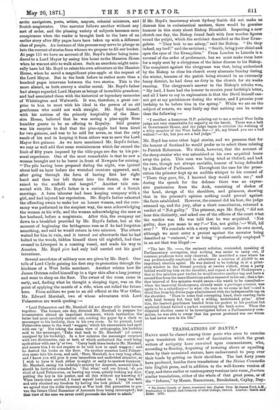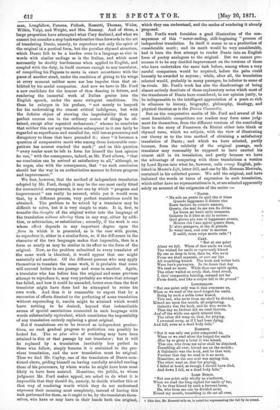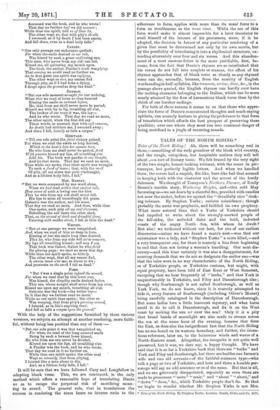TRANSLATIONS OF DANTE.*
DANTE must be classed among those poets who seem to exercise upon translators the same sort of fascination which the great. writers of antiquity have exercised upon commentators, who, according to Bentley, despairing of towering above or equalling them by their unassisted stature, have endeavoured to peep over their heads by getting on their shoulders. The last forty years have produced, besides three translations of the Divine Commedict into English prose, and in addition to the well-known version of Cary, and three earlier or contemporary versions into verse, fourteen similar translations, either of the whole of that great poem, or of the "Inferno," by Messrs. Bannerman, Brooksbank, Cayley, Day- • The Divine Comedy of Dante, translated into English Verse. By James Ford, LH ., Prebendary of Exeter, and formerly of Oriel College, Oxford. London: Smith and Elder. 1870.
man, Longfellow, Parsons, Pollock, Rossetti, Thomas, White, Wilkie, Volpi, and Wright, and Mrs. Ramsay. And of these, a large proportion have attempted what Cary declined, and what we cannot but consider a step backwards rather than forwards in the art Of translating Dante, namely, to reproduce not only the spirit of the original id a poetical form, but the peculiar rhymed structure, which Dante felt to be a burden even in a language so rich in words with similar endings as is the Italian, and which must tiecessatily be doubly burdensome when applied to English, and coupled with the duty, in itself onerous enough to any translator, 'of compelling his Pegasus to move in exact accordance with the paces of another steed, under the condition of giving to his wings at every moment neither more nor less impulse than that ex- hibited by his model companion. And now we have in Mr. Ford -a new candidate for the honour of thus dancing in fetters, and rendering the immortal work of Italian genius into the English speech, under the same stringent conditions. On these he enlarges in his preface, " not merely to bespeak for his undertaking the utmost critical indulgence, but with the definite object of showing the improbability that any perfect success can in the ordinary course of things be ob- tained, except after repeated endeavours ;" whence he concludes that neither this nor any translation subsequent to it can fairly be regarded as superfluous and uncalled for, still less as presuming and derogatory to those that have preceded it ; since " it becomes a question of comparative merit who among these honourable com- petitors has nearest reached the mark ;" and on this question "every reader must be left to form for himself the beat opinion he can," with the consequence, indeed, as Mr. Ford allows, " that co conclusion can be arrived at satisfactory to all," although, as he urges, also with the consequence, that " no such conclusion should bar the way in an authoritative manner to future progress and improvement."
We fear, however, that the method of independent translation adopted by Mr. Ford, though it may be the one most easily fitted for commercial arrangements, is not one by which " progress and improvement" can really be secured, while yet it would seem that, by a different process, very perfect translations could be obtained. The problem to be solved by a translator may be difficult to solve, but it is very simple to state. It is, first, to transfer the thoughts of the original writer into the language of the translation without altering them in any way, either by addi- tion, or subtraction, or substitution ; secondly, if the work is one whose effect depends in any important degree upon the form in which it is presented, as is the case with poems, to reproduce it, either in a similar form, or, if the difference in the character of the two languages makes that impossible, then in a form as nearly as may be similar in its effect to the form of the original. Now, as the problem submitted to every translator of the same work is identical, it would appear that one might materially aid another. Of the different persons who may apply themselves to translate the same work, it is probable that some will succeed better in one passage and some in another. Again, a translator who has before him the original and some previous attempt to reproduce it, may very probably see where that attempt has failed, and how it could be amended, better even than the first translator might have done had he attempted to revise his own work. And thus it is reasonable to expect that by a succession of efforts directed to the perfecting of some translation 'without superseding it, results might be attained which would leave nothing to be desired, beyond that indescribable aroma of special associations connected in each language with words substantially equivalent, which constitutes the impossibility of any translation entirely replacing a great original.
But if translations are to be treated as independent produc- tions, no such gradual progress to perfection can possibly be looked for. The ne plus ultra of rendering may have been attained in this or that passage by one translator; but it will be replaced by a translation inevitably less perfect in those who follow, simply because it is contained in the pre- vious translation, and the new translation must be original. Thus we find Mr. Cayley, one of the translators of Dante men- tioned above, priding himself on having carefully avoided reading those of his precursors, by whoise works he might have been most likely to have been assisted. Meantime, the public, to whose judgment Mr. Ford makes appeal, are asked to do what it is impossible that they should do, namely, to decide whether this or that way of rendering words which they do not understand expresses their meaning moat completely, instead of having this task performed for them, as it ought to be, by the translators them- selves, who have or may have in their hands both the original,
which they can understand, and the modes of rendering it already proposed.
Mr. Ford'e work furnishes a good illustration of the con- sequences of this " never-ending, still-beginning " process of independent translation. In itself it seems to us a production of considerable merit;. and its merit would be very considerable, had it been the first attempt to render Dante into an English form of poetry analogous to the original. But we cannot pro- nounce it to be any decided improvement on the versions of those who have undertaken the same task before, among whom a very careful comparison would be required, before the palm could honestly be awarded to anyone ; while, after all, the translation selected would, probably in many passages, be inferior to some of its rivals. Mr. Ford's work has also the disadvantage of being almost entirely destitute of those explanatory notes which most of the translators of Dante have considered, in our opinion justly, to be indispensable to the intelligent appreciation of a poem so rich in allusions to history, biography, philosophy, theology, and physical theories as is the Divina Commedia.
But on the comparative merits of Mr. Ford and several of his most formidable competitors our readers may form some judg- ment for themselves, from the different versions of the concluding lines in the story of Francesca da Rimini either into blank or rhymed verse, which we subjoin, with the view of illustrating our theory as to the true method of obtaining a satisfactory translation of Dante ; and which we have selected, partly because, from the celebrity of the original passage, each translator may reasonably be supposed to have exerted his utmost skill in its translation, and partly because we have the advantage of comparing with these translations a version by Lord Byron into what he, however, calls cramp English, pub- lished in Moore's Life, letter 363, and one by Mr. Herman Merivale, contained in his collected poems. We add the original, and have italicized the words or turns of expression in each translation, which either have no representatives in it, or are selected apparently solely on account of the exigencies of the metre
Darns.
"Ma solo nn panto fu quel ohs ci vines
Quando leggemmo it disiato riso Esser baciato da cotanto amante, Quash:), ohs mai da me non fia diviso.
La bocce mi bacib tutto tremante. Galeotto fu it libro at chi lo scrisse: Quel giorno pia non vi leggemmo avante, Mentre cbe rano spirto quests disse, L' altro piangeva, si the di pietade Io venni men, cosi corn' io morisse E caddi, come corpo morto cads."
CLEF.
"But at one point Alone we fell. When of that smile we read, The wished-for smile so rapturously kissed By one so deep in love, then he, who ne'er From me shall separate, at once my lips All trembling kissed. The book and writer both Were love's purveyors. In its leaves that day We read no more. While thus one spirit spoke, The other wailed so sorely, that, heart struck, I, thro' compassion fainting, seemed not far From death, and like a corpse fell to the ground."
LONGFELLOW.
"Bat one point only was it that overcame us, When as we read of the much longed-for smile, Being by such a noble lover kissed,
This one, who ne'er from me shall be divided, Kissed me upon the mouth, all palpitating. Galeotto was the book, and he who wrote it. That day no further did we read therein,
And all the while one spirit uttered this, The other did weep so, that, for pitying, I swooned away, as if I had been dying,
And fell, even as a dead body falls."
Ross=
"But it was only one point conquered us, When as we read about the longed-for smile low by so great a lover it was kissed, This one, who from me ne'er shall be disjoined, Trembling all over, kissed me on the mouth; A Galahautt was the book, and he that writ. Further that day we read in it no more. Meantime, as the one soul was saying this, The other wept so, that for pitying,
I failed at heart, as though I should have died, And down I fell, as a dead body falls."
. Low Bram
"But one point only wholly us o'erthrew, When we read the long-sighed for smile of her,
To be thus kissed by such a fervent lever,
Ho, who from me can be divided ne'er, Kissed my mouth, trembling in the act all over,
t This line, Mr. Rossetti tells us, is noted for representingthe fall by Its sound.
Accursed was the book, and he who wrote ! That day no farther leaf we did uncover ; While thus one spirit, told us of their lot, The other wept so, that with pity's thralls
I swooned, as if by death I had been smote,
And fell down, even as a dead body falls."
CAYLEY.
",One only passage our endurance quelled ; For when the smile desired in our tale,
Was kissed by such a great andloving one,
This man, who never from my side can fail,
_Kissed me, all quivering, my mouth upon.
The book, the author, Pander's trade was plying.
That evening we could read no further on. As in that guise one spirit was replying, The other wept so sore, my senses fled
Through pity, as if I had been a dying,
I dropt upon the ground as drop the dead."
DAMAN.
• ' Bat one sole moment wrought for our undoing, When that we read of lover so true-hearted Kissing the smile so coveted before,
He, that from me shall never more be parted,
Kissed me with lip to lip, trembling all o'er, The broker of our vows it was, the lay—
And he who wrote. That day we read no more, The other spirit, when the first did say
These words, so moaned, that with soft remorse, As death had stricken me, I swooned away ; And down I fell, heavily as falls a corpse."
MERWALE.
" Till one sole point the fatal victory gained, For when we read the smile so long desired, Which to the lover's kiss her answer bore, He who from me shall never be parted, fired With passion kissed my lips, all trembling o'er Like his. The book was pander to our thought, And be that wrote. That day we read no more. Thus while one spoke, that other spirit was wrought To such a flood of tears ; that, with the swell Of pity, all my sense was quite o'erfraught, And as a lifeless body falls, I fell."
MRS. RAMSAY.
44 But we were conquered by one word alone, When we had read within that ancient tale, How sweet of such a loving one the kiss.
Then he who from my side shall never fail,
His lips to mine all tremblingly did press.
Galeotto was the author, and his name.
That day we read no more. And then, while thus
One spake, such pity all my soul o'ercame, Beholding the sad tears the other shed, That, on the strand of dark and dreadful fame, Fainting with sudden shock, I fell as falls the dead."
WRIGHT.
"But at one passage we were vanquished.
An when we read of him so deep in love, Kissing at last the smile long time desired, Then he, who from my side will ne'er remove, My lips all trembling kissed ; well may I say That book was Galeot, Galeot he who fired Its glowing page: we read no more that day. While thus one spirit spoke, so bitterly The other wept, that all my senses fled, A swoon came o'er me, as about to die ; And prostrate on the earth I fell as dead."
FORD.
"But t'was a single point infired the wound, For when we read that by this lover true, Was kissed, the dimpling smile desired before, This one, whom nought shall sever from my view,
Kissed me upon my mouth, trembling all o'er.
Galeotto was the book—the writer too—
In it that day we further read no more.'
While as one spirit thus spake ; the other so
Was weeping, that from pity's piercing wound,
I fainted, as in life's expiring thro'.
And fell as falls a corpse upon the ground."
With the help of the suggestions furnished by these various -versions, we subjoin an attempt at another rendering, more faith- ful, without being less poetical than any of them :- "But one sole point it was that vanquished us, For when we read of the long-coveted smile Being by such a fervent lover kissed,
He who from me can never be divided, Kissed me upon the lips, all trembling o'er. A Pander was the book, and he who wrote.
That day we read in it no farther on.
While thus one spirit spake, the other soul Wept so intensely, that from pitying,
I fainted like a man about to die, And, as a lifeless body falls, I fell."
It will be seen that we have followed Cary and Longfellow in Adopting blank verse. This, we are convinced, is the only method which offers a reasonable hope of translating Dante so as to escape the perpetual risk of sacrificing mean- ing to sound. The general rule, that in translations the success in rendering the sense bears an inverse ratio to the
adherence to form, applies with more than its usual force to a form so troublesome as the terza rima. While the use of this form would make it almost impossible for a later translator to avail himself of the labours of his precursors, since, if it be adopted, the decision in favour of any particular rendering of a given line must be determined not only by its own merits, but by the possibility of introducing it into a rhythmical structure, ex- tending alternately over four and six verses. And this abandon- ment of a most onerous fetter is the more justifiable, first, be- cause, from the fact that Dante's rhymes are so interlinked that his verses do not fall into couplets or stanzas, the effect of his rhymes approaches that of blank verse as closely as any rhymed verse can do ; secondly, because, from the scarcity of English wordsendingin half-syllables, like trenzante, scrisse, disse, &c., in the passage above quoted, the English rhymes can hardly ever have the melting character belonging to the Italian, which can be more nearly attained by the flow of harmonious blank verse than by the chink of our harsher endings.
For both of these reasons it seems to us that those who appre- ciate the force of Dante's concentrated thoughts and much-saying epithets, can scarcely hesitate in giving the preference to that form of translation which affords the beat prospect of preserving these qualities ; over one where they must run into continual danger of being sacrificed to a jingle of recurring sounds.




































 Previous page
Previous page